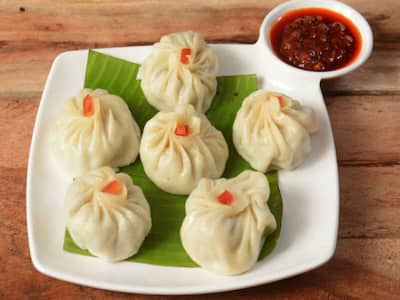
During the rainy season, avoiding momos and opting for warm, light, and easily digestible foods can help maintain balance and promote overall health.
Momos have risen to the top of the street food chain in the past ten years. It is made of ordinary flour stacked with delectable stuffing and is readily available. Everyone likes momos, but did you realize they harm our health? Soft flour balls stuffed with veg or non-veg filling and served with hot chutneys and sauces are unhealthy and can cause considerable long-term harm to the body. Ritucharya is an ancient Ayurvedic practice consisting of a lifestyle and diet routine that adheres to Ayurveda’s guidelines to deal with seasonal changes’ physical and mental effects.
Each Season Affects Our Bodies Differently
Following the appropriate ritucharya helps prevent imbalances and diseases. The rainy season, also known as Varsha Ritu, is characterized by increased humidity and atmospheric moisture. During this time, the digestive fire (Agni) is relatively weak, making our digestive system more vulnerable to imbalances. Ayurveda advises against consuming certain foods that can aggravate the doshas (biological energies) and weaken agni, and one such food is momos.
Ayurvedic Perspective On Momos
Momos are popular street food, and while momos may be tempting, Ayurveda cautions against their consumption during Varsha Ritu due to several reasons:
READ RELATED: Addressing The Taboo Behind Co-parenting: Here Are Some Effective Strategies To Make It Work
- Unhealthy Food Combinations: Momos are commonly served with spicy and tangy chutneys, which can create incompatible food combinations, according to Ayurveda. Mixing foods with different tastes, qualities, and digestion times can disrupt the digestive process and form ama (toxic residues).
- Aggravation of Kapha Dosha: During the rainy season, the predominant dosha is Kapha, associated with qualities like cold, wet, heavy, and slow. Consuming often oily, fatty, and cold momos can aggravate Kapha dosha, leading to lethargy, heaviness, and increased mucus production.
- Contamination Concerns: During the rainy season, moisture and humidity create favourable conditions for the growth of bacteria and microorganisms. Street foods like momos, often prepared and sold in open areas, may pose a higher risk of contamination, leading to foodborne illnesses.
- Impact on Digestive Fire (Agni): As mentioned earlier, Varsha Ritu weakens the digestive fire. Momos are challenging to digest, and their consumption can burden the already compromised agni, leading to indigestion, bloating, and discomfort.
In Conclusion
Ayurveda’s ritucharya principles remind us to adjust our lifestyle and diet to the changing seasons. During the rainy season, avoiding momos and opting for warm, light, and easily digestible foods can help maintain balance and promote overall health. Dr Chanchal Sharma, the director, provided the information for this article; therefore, Do it only after consulting a doctor.
Total Wellness is now just a click away.
Follow us on
Don’t Miss Out on the Latest Updates.
Subscribe to Our Newsletter Today!
window.addEventListener(‘load’, (event) => {
$(‘#commentbtn’).on(“click”,function(){
(function(d, s, id) { var js, fjs = d.getElementsByTagName(s)[0]; if (d.getElementById(id)) return; js = d.createElement(s); js.id = id; js.src = “//connect.facebook.net/en_US/sdk.js#xfbml=1&version=v2.3”; fjs.parentNode.insertBefore(js, fjs);}(document, ‘script’, ‘facebook-jssdk’));
$(“.cmntbox”).toggle();
});
});







